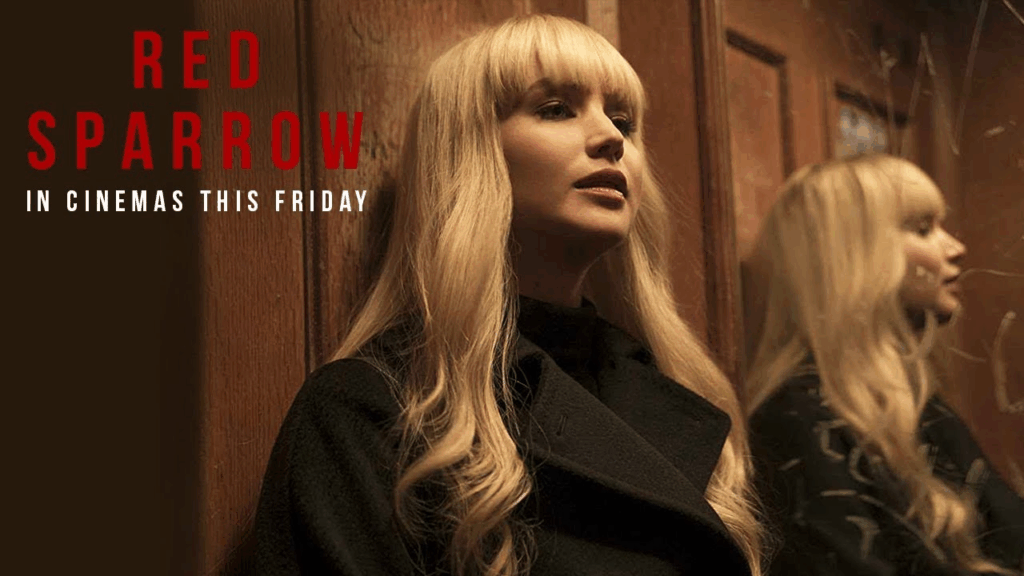Red Sparrow

Red Sparrow: A Deep Dive into the World of Espionage and Intrigue
Introduction
Red Sparrow (2018) is a gripping spy thriller that delves into the shadowy world of espionage, weaving a tale of manipulation, betrayal, and survival. Directed by Francis Lawrence and based on the 2013 novel of the same name by Jason Matthews, a former CIA officer, the film offers a gritty, morally complex portrayal of intelligence operations. Starring Jennifer Lawrence as Dominika Egorova, a former ballerina turned Russian intelligence operative, Red Sparrow combines intense psychological drama with high-stakes action. This article provides a comprehensive introduction to the film, covering its plot, characters, themes, production, reception, and cultural impact, offering a thorough exploration for both newcomers and fans.

Plot Summary
Red Sparrow follows Dominika Egorova, a celebrated Russian ballerina whose career is shattered by a devastating injury during a performance. Faced with financial ruin and the need to care for her ailing mother, Dominika is coerced by her uncle, Ivan Egorov (Matthias Schoenaerts), a high-ranking official in Russia’s SVR (Foreign Intelligence Service), into joining a secretive program known as “Sparrow School.” This clandestine operation trains young recruits to use their bodies and minds as weapons, mastering seduction, manipulation, and espionage to serve the state’s interests.
Dominika is sent on a mission to Budapest to uncover the identity of a mole within Russian intelligence by making contact with Nate Nash (Joel Edgerton), a CIA operative. As she navigates a web of deception, Dominika must balance her loyalty to Russia with her growing distrust of her handlers and her complex relationship with Nash. The plot unfolds with twists and turns, exploring themes of power, betrayal, and personal agency as Dominika fights to reclaim control over her life in a world where trust is a luxury she cannot afford.
The narrative is structured around Dominika’s transformation from a vulnerable recruit to a cunning double agent, with key plot points revolving around her training, her missions, and her internal struggle to maintain her humanity. The film builds to a climactic confrontation that tests her ingenuity and resolve, delivering a resolution that is both satisfying and morally ambiguous.

Characters and Cast
The film boasts a stellar ensemble cast, with each actor bringing depth to their complex roles:
- Jennifer Lawrence as Dominika Egorova: The film’s protagonist, Dominika is a fiercely intelligent and resilient woman forced into espionage after a career-ending injury. Lawrence’s performance captures Dominika’s vulnerability, strength, and cunning as she navigates a perilous world. Her ballet background adds authenticity to the character’s early scenes, while her emotional range conveys the toll of her transformation.
- Joel Edgerton as Nate Nash: A principled CIA operative who becomes entangled with Dominika. Nash is both a professional adversary and a potential ally, and Edgerton’s portrayal balances rugged determination with subtle emotional depth.
- Matthias Schoenaerts as Ivan Egorov: Dominika’s manipulative uncle, whose cold ambition drives much of the plot. Schoenaerts infuses Ivan with a chilling blend of charm and menace.
- Charlotte Rampling as Matron: The head of Sparrow School, a steely figure who trains recruits in psychological and physical manipulation. Rampling’s icy performance underscores the program’s brutality.
- Jeremy Irons as General Korchnoi: A high-ranking Russian official whose motives remain ambiguous until the film’s climax. Irons brings gravitas and nuance to the role.
- Mary-Louise Parker as Stephanie Boucher: A U.S. official with secrets of her own, adding a layer of intrigue to the American side of the story.
Supporting performances by Ciarán Hinds, Joely Richardson, and Bill Camp further enrich the film’s world, creating a tapestry of characters whose motives are rarely what they seem.

Themes and Style
Red Sparrow explores several enduring themes, making it more than a standard spy thriller. At its core, the film examines power and control, particularly through the lens of gender dynamics. Dominika’s training at Sparrow School forces her to weaponize her sexuality, raising questions about autonomy and exploitation in the world of espionage. The film also delves into loyalty and betrayal, as characters navigate a landscape where allegiances shift and trust is a liability. The moral ambiguity of the spy world is a recurring motif, with no clear heroes or villains—only survivors.
Stylistically, Red Sparrow blends gritty realism with cinematic flair. Director Francis Lawrence, known for his work on The Hunger Games series, employs a muted color palette to evoke the cold, oppressive atmosphere of post-Soviet Russia and Eastern Europe. The film’s pacing alternates between tense, dialogue-driven scenes and bursts of visceral action, including brutal fight sequences and moments of psychological horror. The cinematography, by Jo Willems, uses tight framing and shadowy lighting to mirror Dominika’s claustrophobic reality, while the score by James Newton Howard underscores the tension with haunting, minimalist compositions.

Production and Development
Red Sparrow was adapted from Jason Matthews’ novel by screenwriter Justin Haythe, who streamlined the book’s complex narrative while retaining its core themes. The project reunited director Francis Lawrence with Jennifer Lawrence (no relation), leveraging their prior collaboration to bring authenticity to Dominika’s arc. Filming took place across multiple European locations, including Budapest, London, and Bratislava, to capture the story’s international scope. The production team worked closely with consultants, including Matthews, to ensure the espionage elements felt authentic, from tradecraft to psychological manipulation techniques.
The film’s depiction of Sparrow School drew particular attention during production, as it tackled sensitive themes of sexual coercion and psychological abuse. The filmmakers aimed to portray these elements with nuance, avoiding gratuitous sensationalism while highlighting the ethical complexities of Dominika’s journey. Jennifer Lawrence prepared extensively for the role, training in ballet and studying Russian culture to embody the character fully.

Reception and Impact
Upon its release on March 2, 2018, Red Sparrow received mixed reviews from critics but found a dedicated audience among fans of the spy genre. Critics praised Jennifer Lawrence’s commanding performance and the film’s atmospheric tension, with outlets like The New York Times noting its “unflinching look at the cost of espionage.” However, some reviewers, such as those from Variety, criticized its pacing and complex plot, arguing that it occasionally felt overstuffed. The film’s graphic content, including scenes of violence and sexual manipulation, sparked debate about its portrayal of gender and power, with some praising its boldness and others questioning its approach.
Commercially, Red Sparrow grossed over $151 million worldwide against a $69 million budget, making it a moderate box office success. Its home media release and streaming availability on platforms like Hulu and Amazon Prime further expanded its reach, cementing its status as a cult favorite among spy thriller enthusiasts.
The film also contributed to broader conversations about representation in espionage narratives. Unlike traditional spy films centered on male protagonists, Red Sparrow places a female operative at its heart, offering a fresh perspective on a genre often dominated by figures like James Bond or Jason Bourne. Its exploration of psychological manipulation and state-sponsored coercion resonated with audiences in an era of heightened geopolitical tension.

Cultural and Historical Context
Red Sparrow arrived at a time of renewed interest in Cold War-inspired narratives, reflecting real-world tensions between Russia and the West. The film’s depiction of Russian intelligence operations, while fictionalized, draws on historical practices, such as the Soviet Union’s use of “honey traps” and psychological training in espionage. Jason Matthews’ background as a CIA officer lent credibility to the story, grounding its more sensational elements in a framework of plausible tradecraft.
The film’s focus on a female spy also intersects with cultural discussions about gender roles in film. Dominika’s arc challenges traditional tropes of the femme fatale, presenting her as both victim and agent of her own destiny. This duality sparked analysis in academic and feminist circles, with some scholars citing Red Sparrow as a case study in the portrayal of women in high-stakes genres.

Legacy and Potential Sequels
While Red Sparrow was initially envisioned as the start of a franchise, based on Matthews’ trilogy (which includes Palace of Treason and The Kremlin’s Candidate), no sequels have been produced as of 2025. The film’s open-ended conclusion leaves room for further exploration of Dominika’s story, and fan interest persists on platforms like X, where discussions about a potential follow-up occasionally resurface. However, shifts in the film industry and the challenges of adapting the increasingly complex sequels have left the franchise’s future uncertain.
The film’s legacy lies in its bold take on the spy genre, its standout performances, and its willingness to confront uncomfortable themes. It remains a compelling entry in the canon of modern espionage films, alongside titles like Tinker Tailor Soldier Spy and Atomic Blonde.

Conclusion
Red Sparrow is a provocative and visually striking addition to the spy thriller genre, distinguished by its complex protagonist, intricate plot, and unflinching exploration of espionage’s darker corners. Jennifer Lawrence’s powerhouse performance, coupled with Francis Lawrence’s assured direction, makes the film a memorable journey into a world of deception and survival. Whether you’re drawn to its psychological depth, its geopolitical intrigue, or its intense action, Red Sparrow offers a rich cinematic experience that lingers long after the credits roll. For those seeking a thought-provoking thriller that challenges conventions, this film is a must-watch.